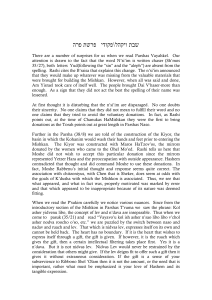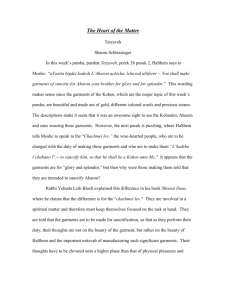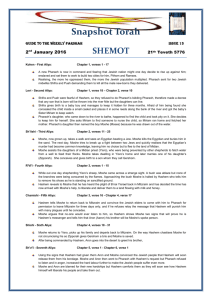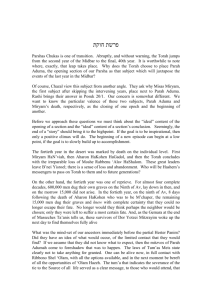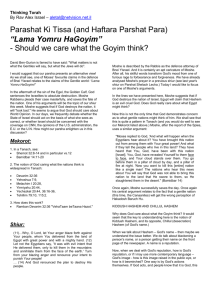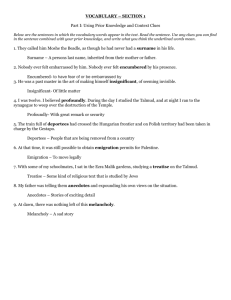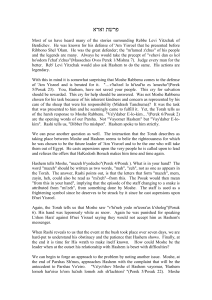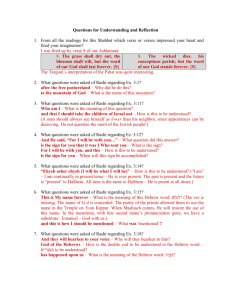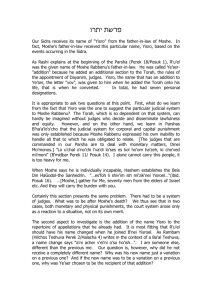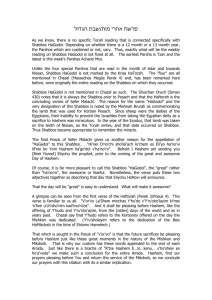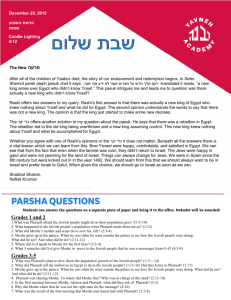Shemo - Tiferet
advertisement
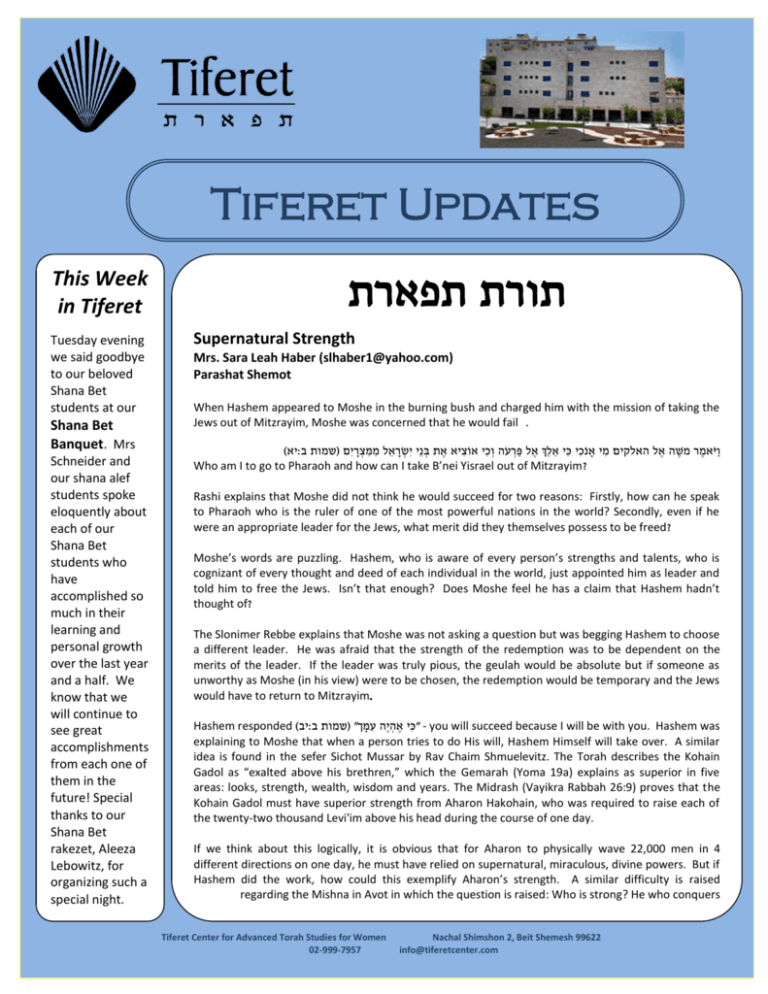
Tiferet Updates This Week in Tiferet Tuesday evening we said goodbye to our beloved Shana Bet students at our Shana Bet Banquet. Mrs Schneider and our shana alef students spoke eloquently about each of our Shana Bet students who have accomplished so much in their learning and personal growth over the last year and a half. We know that we will continue to see great accomplishments from each one of them in the future! Special thanks to our Shana Bet rakezet, Aleeza Lebowitz, for organizing such a special night. תורת תפארת Supernatural Strength Mrs. Sara Leah Haber (slhaber1@yahoo.com) Parashat Shemot When Hashem appeared to Moshe in the burning bush and charged him with the mission of taking the Jews out of Mitzrayim, Moshe was concerned that he would fail . )יא:משה אֶ ל האלקים ִמי ָאנֹּ כִ י כִ י אֵ לְֵך אֶ ל פַ ְרעֹּה וְ כִ י או ִֹּציא אֶ ת ְבנֵי י ְִש ָראֵ ל ִמ ִמ ְצ ָריִ ם (שמות ב ֶ וַ יֹּאמֶ ר Who am I to go to Pharaoh and how can I take B’nei Yisrael out of Mitzrayim? Rashi explains that Moshe did not think he would succeed for two reasons: Firstly, how can he speak to Pharaoh who is the ruler of one of the most powerful nations in the world? Secondly, even if he were an appropriate leader for the Jews, what merit did they themselves possess to be freed? Moshe’s words are puzzling. Hashem, who is aware of every person’s strengths and talents, who is cognizant of every thought and deed of each individual in the world, just appointed him as leader and told him to free the Jews. Isn’t that enough? Does Moshe feel he has a claim that Hashem hadn’t thought of? The Slonimer Rebbe explains that Moshe was not asking a question but was begging Hashem to choose a different leader. He was afraid that the strength of the redemption was to be dependent on the merits of the leader. If the leader was truly pious, the geulah would be absolute but if someone as unworthy as Moshe (in his view) were to be chosen, the redemption would be temporary and the Jews would have to return to Mitzrayim. Hashem responded )יב: "כִ י אֶ ְהיֶה ִעמָ ך" (שמות ב- you will succeed because I will be with you. Hashem was explaining to Moshe that when a person tries to do His will, Hashem Himself will take over. A similar idea is found in the sefer Sichot Mussar by Rav Chaim Shmuelevitz. The Torah describes the Kohain Gadol as “exalted above his brethren,” which the Gemarah (Yoma 19a) explains as superior in five areas: looks, strength, wealth, wisdom and years. The Midrash (Vayikra Rabbah 26:9) proves that the Kohain Gadol must have superior strength from Aharon Hakohain, who was required to raise each of the twenty-two thousand Levi'im above his head during the course of one day. If we think about this logically, it is obvious that for Aharon to physically wave 22,000 men in 4 different directions on one day, he must have relied on supernatural, miraculous, divine powers. But if Hashem did the work, how could this exemplify Aharon’s strength. A similar difficulty is raised regarding the Mishna in Avot in which the question is raised: Who is strong? He who conquers Tiferet Center for Advanced Torah Studies for Women 02-999-7957 Nachal Shimshon 2, Beit Shemesh 99622 info@tiferetcenter.com MAZAL TOV! The Little Spark of Greatness Chani Colton (Tiferet 5773) Liron KrishtalFischer (5768) on week! Mazal Tov to Rav Elie and Mrs. Pesha onher Aliyah At this the completion of each day of creation, it writes 'veyar Hashem ki tov'. The first time we see this the Bat Mitzvah of their daughter, Ruchama! statement is when Hashem looks at the light He May they continue to see great nachat from her. created and saw that it was tov. It then says that Hashem separated between the light and the dark. The reason why Hashem did this is because He realized the light was too good and pure for the reshaim, so therefore He made a separation between the light and the dark. Therefore it says, 'ki tov', so that the light would be set aside for the tzadikim. )(המשך תורת תפארת his Yetzer Harah. Yet the Gemarah (Sukkah 52) clearly states “It is absolutely impossible for a person to conquer his yetzer harah, if not for Hashem’s help.” So why does one who vanquishes his evil inclination exemplify a strong person if he himself is actually not responsible for the victory? Rav Chaim explains that we are incorrectly defining gevurah as strength. In reality, a gibbor is neither a physically powerful person, as the midrash about Aharon seems to imply nor even a spiritually selfcontrolled person as the mishnah regarding conquering the yetzer harah might be understood. Rather, a gibbor is someone who pours all his energy into completing a worthwhile task even when it seems unbelievably difficult. Hashem rewards the gibbor by finishing the job for him . It is interesting to note that Moshe’s salvation from the Nile River came about through someone whose fame lies in her ability to exemplify precisely that middah. The well-known midrash describes Batya as stretching out her hand to reach the floating cradle despite the fact that physically, under natural circumstances, there was absolutely no way she could reach it. She was, however, so moved by Moshe’s tears that she felt a strong need to do something, anything to help him. As she stretched her arm to its physical limit, Hashem completed the job for her. Thus the ultimate geulah of the Jews which demanded Moshe’s comprehension that as a true gibbor he had to agree to do all he could without worrying about completion, began with the actions of a woman who intuitively understood that concept completely. We all face challenges of varying levels on a daily basis. Some may seem insurmountable but we know that Hashem never gives us tests we cannot pass. May Hashem give us the strength to be true gibborim – to persevere and extend ourselves to our utmost abilities even when things seem impossibly difficult. If we do so, He will finish the job. We see this idea portrayed in this week's parsha. Parshat Shemot, perek bet, talks about Moshe's birth. The Torah write that a woman from shevet Levi gives birth, sees that he is good and that hid him for three months. The Ramban asks about this by saying that every mother would consider her son to be "good" and hide him from danger. So what is different here? What does Yocheved seeing Moshe as "good", which is obvious, have anything to do with hiding him? The Ramban says that this is a different type of "good.” Yocheved looked at Moshe and saw an unusual supernatural goodness. Because of this she realized it was her obligation to hide him from the evil decree of killing the first born son. It says in Sotah that 'ki tov', means that when Moshe was born the entire world became filled with light, and this caused Yocheved to think that miracles would come from this baby. The light that was set aside for tzadikim in parshat Bareshit is now displayed in Shemot for Moshe. Yocheved hid him from the Egyptians because they were reshaim and did not deserve to see the special light. We should learn from this that we are all born with greatness. We all have a spark of light within us. Our job in this world is to find this light and to seek it out from within us, in order to reach our potential of becoming tzadikim. We all have kedusha inside us and we must therefore separate ourself from the darkness of the world. "V'yavdel bein ha'or o'vain ha'choshech" (Bereishit Perek 1). "Va'tereh ohto ki tov who ve'titzpanehu shlosha yerachim" (Shemot Perek 2). We must separate the light from the dark and see the good from within us and hide it from the bad. Shabbat Shalom.
